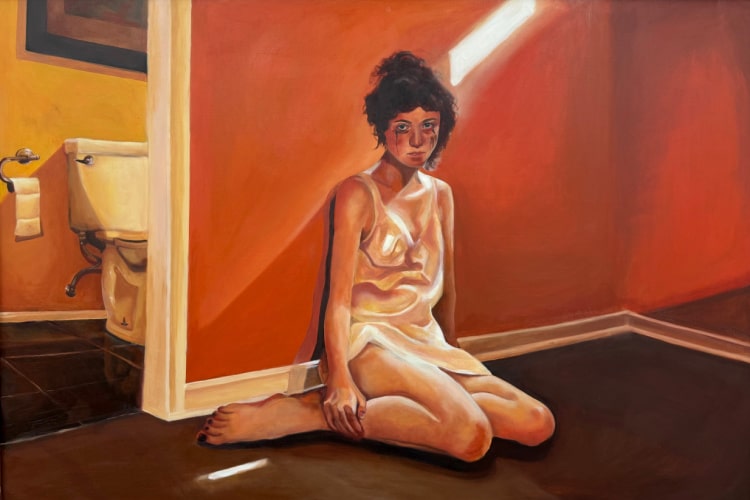Artifacts teach powerful lessons at Center for Holocaust and Humanity Education
When Leo Willich was having a really bad day, he pulled out a box he had protected for decades. Inside was a clean uniform with hauntingly familiar vertical stripes and sewn-on tags. He would put on the garment he wore every day at Auschwitz and look in the mirror. From the safety of his home in Cincinnati, he would have hope for a better day.”That teaches a lesson in itself,” says Sarah Weiss, 29, executive director of The Center for the Holocaust and Humanity Education in Kenwood, where Willich’s uniform is displayed in the Mapping Our Tears exhibit.The collection of artifacts from Holocaust survivors who settled in Cincinnati connects the past with the present, and the future, in a powerful way. A pair of battered gold earrings tells the story of a teen girl’s determination to keep her connection to her family alive. A potato peeler serves as a reminder of those who risked their lives to hide Jewish families from Nazi soldiers.Along with a theater that looks and feels like an attic, where visitors watch video testimonies from local survivors, the artifacts reflect the Center’s founders, a group of Holocaust survivors who met regularly beginning in the 1950s. They gathered for support and for connection. “It was more like family,” Weiss says.From 2000 until 2006, the Center was housed at Hebrew Union College in Clifton. A desire for more space and an independent identity converged when the Center became a distinct non-profit and moved to the campus of Rockwern Academy on Montgomery Road.Weiss explains that the Center’s mission reaches beyond honoring the memories of the Holocaust. “We want to teach everyone who comes to be critical thinkers,” she says. “That is equally important.”With just three full-time staff and one Public Ally, the Center provides programming for and education to more than 40,000 people each year. In 10 years, its programs have touched a half million lives. Do good:• Visit the Center. Find a place of deep knowledge and even deeper respect for humanity between 9 a.m. and 5 p.m. weekdays and 11 a.m. till 3 p.m. Sundays. Entrance cost is a $5 donation per person, but Weiss adds that no visitor will be turned away.• Remember May 1. Designated Yom Hashoah, it is the date on which all who died during the Holocaust—most of whom left little evidence of their lives, much less their death date–are remembered and honored.• Be a friend. “Like” The Center for Holocaust and Humanity Education on Facebook. ?• Run The Great Human Race. Lace up your shoes for the May 15 fundraiser at Lunken Airport Playfield.By Elissa YanceyPhoto courtesy The Center for Holocaust and Humanity Education
When Leo Willich was having a really bad day, he pulled out a box he had protected for decades. Inside was a clean uniform with hauntingly familiar vertical stripes and sewn-on tags. He would put on the garment he wore every day at Auschwitz and look in the mirror. From the safety of his home in Cincinnati, he would have hope for a better day.
“That teaches a lesson in itself,” says Sarah Weiss, 29, executive director of The Center for the Holocaust and Humanity Education in Kenwood, where Willich’s uniform is displayed in the Mapping Our Tears exhibit.
The collection of artifacts from Holocaust survivors who settled in Cincinnati connects the past with the present, and the future, in a powerful way. A pair of battered gold earrings tells the story of a teen girl’s determination to keep her connection to her family alive. A potato peeler serves as a reminder of those who risked their lives to hide Jewish families from Nazi soldiers.
Along with a theater that looks and feels like an attic, where visitors watch video testimonies from local survivors, the artifacts reflect the Center’s founders, a group of Holocaust survivors who met regularly beginning in the 1950s. They gathered for support and for connection. “It was more like family,” Weiss says.
From 2000 until 2006, the Center was housed at Hebrew Union College in Clifton. A desire for more space and an independent identity converged when the Center became a distinct non-profit and moved to the campus of Rockwern Academy on Montgomery Road.
Weiss explains that the Center’s mission reaches beyond honoring the memories of the Holocaust. “We want to teach everyone who comes to be critical thinkers,” she says. “That is equally important.”
With just three full-time staff and one Public Ally, the Center provides programming for and education to more than 40,000 people each year. In 10 years, its programs have touched a half million lives.
Do good:
• Visit the Center. Find a place of deep knowledge and even deeper respect for humanity between 9 a.m. and 5 p.m. weekdays and 11 a.m. till 3 p.m. Sundays. Entrance cost is a $5 donation per person, but Weiss adds that no visitor will be turned away.
• Remember May 1. Designated Yom Hashoah, it is the date on which all who died during the Holocaust—most of whom left little evidence of their lives, much less their death date–are remembered and honored.
• Be a friend. “Like” The Center for Holocaust and Humanity Education on Facebook. ?
• Run The Great Human Race. Lace up your shoes for the May 15 fundraiser at Lunken Airport Playfield.
By Elissa Yancey
Photo courtesy The Center for Holocaust and Humanity Education















